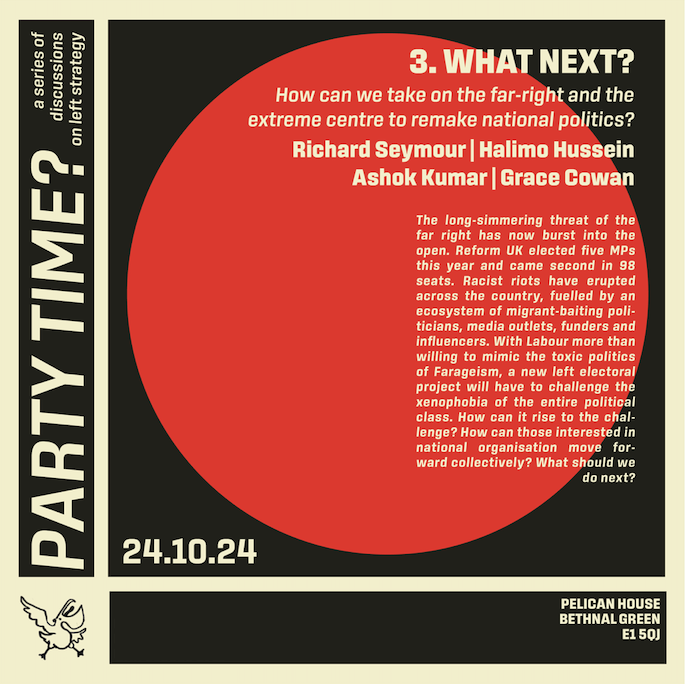How can we take on the far-right and the extreme centre to remake national politics?
With contributions from…
Richard Seymour / Ashok Kumar / Halimo Hussein / Grace Cowan
Arrive from 6pm / Discussion from 7.15 / Ends by 11pm
The long-simmering threat of the far right has now burst into the open. Reform UK elected five MPs this year and came second in 98 seats. Racist riots have erupted across the country, fuelled by an ecosystem of migrant-baiting politicians, media outlets, funders and influencers. With Labour more than willing to mimic the toxic politics of Farageism, a new left electoral project will have to challenge the xenophobia of the entire political class. How can it rise to the challenge? How can those interested in national organisation move forward collectively? What should we do next?
We encourage participants to attend all events in the series if possible. Tickets are free, but please consider making a donation if you can!
MORE INFORMATION ON THE SERIES BELOW!
Introduction to the Series
Pelican House is hosting a series of meetings on left electoral strategy and the prospects for a new party. Bringing together politicians, activists and intellectuals in a public forum, these discussions will seek to clarify the current aims of socialist organising. What institutional form should it take? How should it combat both the far right and the extreme centre? What are the main obstacles and opportunities in the present political landscape?
Join us and your fellow comrades for a series of three discussions of these strategic questions, followed by a social! After introductions from our guest speakers, we will follow an assembly format with the intent of stimulating debate between the audience. Following our collective discussion, we invite you to stay and discuss these questions more socially with one another.
Why This & Why Now?
The Starmer government has set out its agenda in no uncertain terms: hardening authoritarianism, inaction on the climate crisis, austerity at home and militarism abroad. Its invincible majority represents a defeat for the left – but also an opportunity, because Labour’s rightward turn has created a political vacuum which the socialist movement is already starting to fill. Most militant workers and activists have torn up their membership cards. Nine MPs have been elected on left-of-Labour platforms. Comrades across the country are considering the possibility of forming our own electoral vehicle. Now, these forces must come together to discuss the most urgent strategic issues: the left’s current power bases, the pathway to a new party and how it could channel popular discontent. We must also place the present political moment in a broader theoretical and historical perspective, assessing the relationship between party and class, the practice of organising on a mass scale and the process of achieving social transformation.
These fundamental questions will form the basis of three panel discussions: on the condition of contemporary Britain, the dynamics of establishing a new party, and the threats and opportunities it will encounter over the coming years. The aim is to develop a coherent plan for building a radical electoral organisation and map the social terrain in which it will have to operate. Speakers will include socialist politicians and strategists, commentators and academics, organisers and activists, plus the public audience who will be encouraged to share their views. This will bring the conversations that are currently taking place in private, among small groups of comrades, into the public sphere – where a collective strategy can begin to take shape.
Other Discussions in the Series
1: What’s Left? Is this moment of national decline a political opportunity?
Nandita Lal / Owen Hatherley / Dan Evans / Fiona Lali / Phil Burton Cartledge
September 26th / 6pm
For decades, Britain’s working class has been battered by falling wages, rising poverty and gutted public services. The Starmer government is offering them austerity and authoritarianism, while the far right are attempting to capitalise on the atmosphere of discontent. The left, atomised and fragmented in the wake of Corbynism, seems ready to reemerge as a national political force. What are its current power bases? Where is it strong and where is it weak? What type of organisation is needed to challenge Labour’s fragile hegemony and remake our rotten system? Join with other comrades who have been asking these questions for the first in a series of three events exploring left strategy today.
2: What is to be Done? Organisational forms and the prospect of a new party.
Andrew Feinstein / Ash Sarkar / James Schneider / Keir Milburn / Hilary Wainwright
October 10th / 6pm
In 2017, nearly 13 million people voted for Jeremy Corbyn’s radical left-wing programme, demonstrating the viability of a popular mass politics opposed to inequality at home and war abroad. Since then, the establishment has tried to erase that result from public memory. Yet the election of nine Green and independent MPs this year shows that they have not succeeded yet. To capitalise on this historic breakthrough and rebuild our strength at the national level, socialists need a new political organisation. But what form should it take? How should it relate to left parliamentarians, trade unions, social movements and the broader working class – especially outside the major cities? Should it be focused on the electoral sphere, or should it play a more expansive role?

